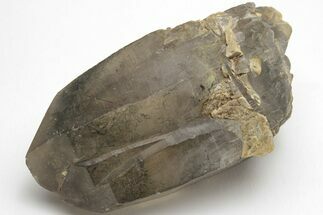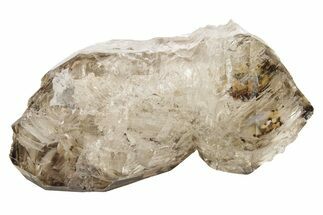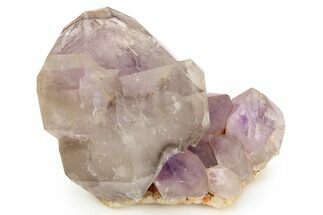This Specimen has been sold.
6" Smoky Quartz Crystal Cluster - Diamond Hill, South Carolina
This quartz cluster from Diamond Hill, South Carolina contains a bed of beautiful terminated crystals, with smoky phantoms appearing in most of the crystals. There is a faint hint of amethyst to some of these crystals, however not enough color to label it as so.
It comes with an acrylic display stand.
It comes with an acrylic display stand.
The Diamond Hill Mine is located in the southern portion of the Appalachian Mountains in South Carolina. Erosion over millions of years exposed this 3-acre spot of mountain that produces some of the widest varieties of quartz variations in the world. Quartz variations such as amethyst, smoky, skeletal(elestial), milky, phantomed, iron and manganese oxide coated, and even aura quartz are know to have been deposited here through silica-rich hydrothermal processes. Other minerals including beryl, epidote, and garnet are known to come out of this location as well.
About Quartz
Quartz is the name given to silicon dioxide (SiO2) and is the second most abundant mineral in the Earth's crust. Quartz crystals generally grow in silica-rich environments--usually igneous rocks or hydrothermal environments like geothermal waters--at temperatures between 100°C and 450°C, and usually under very high pressure. In either case, crystals will precipitate as temperatures cool, just as ice gradually forms when water freezes. Quartz veins are formed when open fissures are filled with hot water during the closing stages of mountain formation: these veins can be hundreds of millions of years old.
Quartz is the name given to silicon dioxide (SiO2) and is the second most abundant mineral in the Earth's crust. Quartz crystals generally grow in silica-rich environments--usually igneous rocks or hydrothermal environments like geothermal waters--at temperatures between 100°C and 450°C, and usually under very high pressure. In either case, crystals will precipitate as temperatures cool, just as ice gradually forms when water freezes. Quartz veins are formed when open fissures are filled with hot water during the closing stages of mountain formation: these veins can be hundreds of millions of years old.
Smoky quartz is a grey-brown to black variety of quartz. This common name is derived from the appearance of smoke within the quartz crystal. Depending on the location and the chemicals present during formation, smoky quartz can appear opaque black, but it is typically translucent to some extent. It is believed that the quartz gains this color from a combination of natural irradiation and aluminum impurities.
SPECIES
Quartz var. Smoky
LOCATION
Diamond Hill, South Carolina
SIZE
6" long, 4.7" wide
CATEGORY
ITEM
#91241
 Reviews
Reviews














